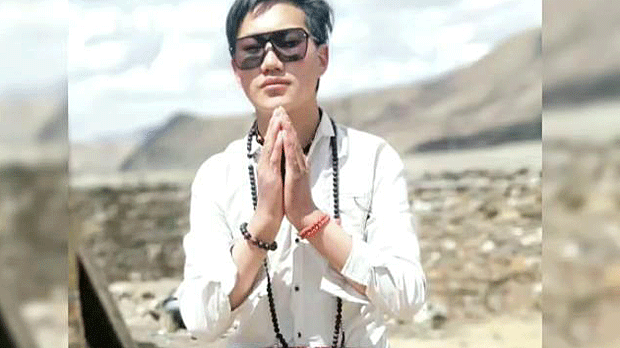Chinese authorities Sichuan on Thursday detained two Tibetans after the pair scattered leaflets calling for Tibetan independence in the courtyard of a Chinese police station in Sershul county, according to Tibetan sources.
The protest by the two men, Yonten and Choegyal, took place at about 2:30 p.m. in front of the police station in Sershul’s Dza Wonpo village in the Kardze (Chinese, Ganzi) Tibetan Autonomous Prefecture, a Tibetan monk living in India told RFA, citing contacts in the region.
“The two men threw leaflets in the air and called out for Tibet’s independence in a protest against the Chinese government,” RFA’s source, named Jampa Yonten, said, adding, “They were immediately taken into custody by the Chinese police.”
Before launching their protest, the two men prepared video clips showing exiled Tibetan spiritual leader the Dalai Lama, together with the words “Independence for Tibet” written out multiple times in black and red ink, and posted them on the popular social media platform WeChat, Jampa Yonten said.
Also posted by the men were verses of support for four Dza Wonpo monks detained in a similar protest on Nov. 7.
The monks—identified as Kunsal, 20, Tsultrim, 18, Tamey, 18, and Soeta, 18—were seized by police in their rooms at Dza Wonpo Ganden Shedrub monastery and are now in custody, sources told RFA in an earlier report.
Police also detained the monks’ religious instructor, Shergyam Yang, a teacher at the monastery, but released him after holding him for 11 days.
Another monk, named Nyime and identified as the brother of Choegyal, was taken into custody on Nov. 18 after posting online expressions of support for those still held.
“It is difficult now to assess the current situation in Dza Wonpo,” Jampa Yonten told RFA on Thursday. “The word is going around that online communications and phone calls to and from Dza Wonpo are being closely monitored by the Chinese.”
No word has been received on Yonten and Choegyal’s present whereabouts or condition, Jampa Yonten said.
“It is time for China’s leaders to rethink their policies in Tibet,” he added.
Already tightly restricted following widespread protests in Tibetan regions in 2008, Dza Wonpo monastery drew increased police scrutiny in 2012 when monks refused to hoist Chinese national flags on the monastery’s roofs, and an ensuing crackdown led to scores of arbitrary detentions, arrests, and searches of Tibetan homes, sources told RFA in earlier reports.
Tibetans say Chinese authorities regularly restrict their political activities and peaceful expression of ethnic and religious identity in the Tibetan region, and subject them to persecution, torture, imprisonment, and extrajudicial killings.

